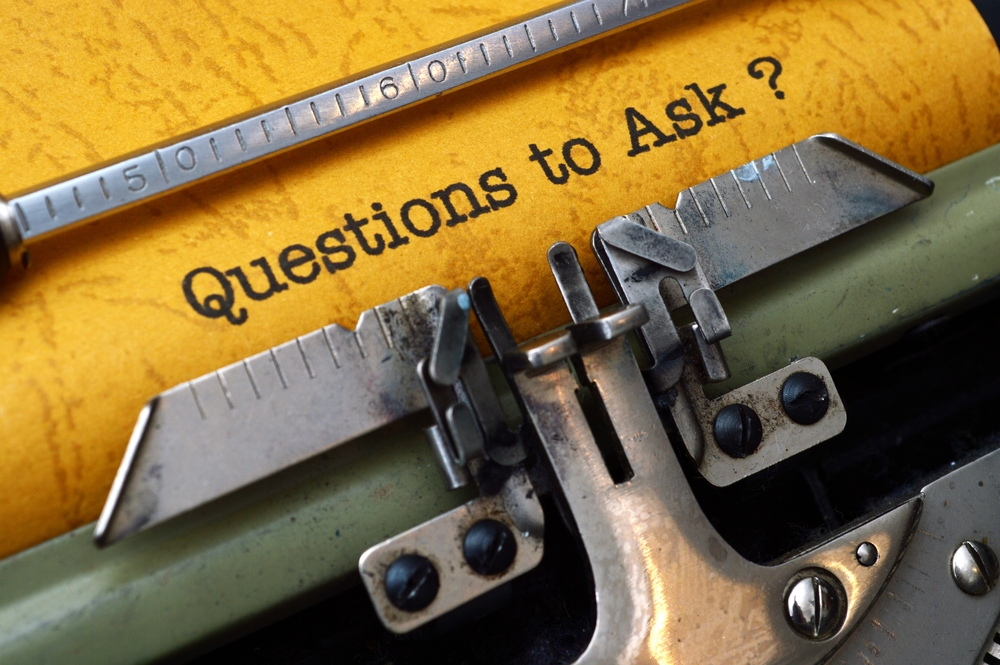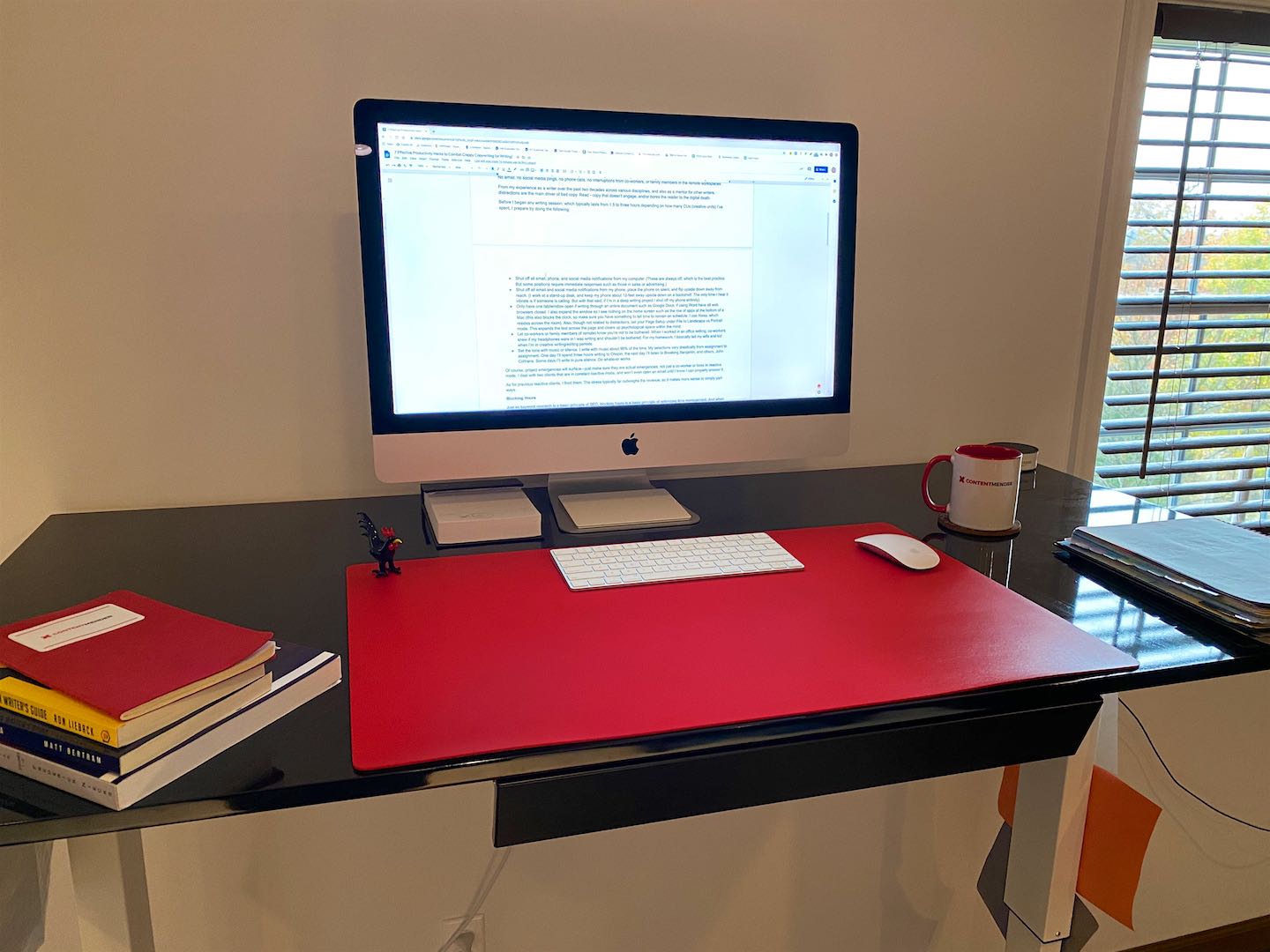If stress begins due to pressing deadlines, not enough sleep, or overall lack of focus and health, you’ll produce crappy copy.
This sentiment rings true regardless of the writing task:
- Product copywriting.
- Blogs.
- White papers.
- Chapters in books.
- Social media posts.
- SEO-driven title tags and meta descriptions.
Heck, even an email to a client or friend will suffer if you’re under stress or lack a sense of well-being.
The number one reason for all this disengaging writing?
A lack of effective productivity habits.
Sure, for many, like news or ad writers, the rush factor surfaces.
But I’d argue that 90% of those rushed situations can be attributed to unproductive habits at the top of the workflow chain.
Regardless of where these unproductive habits derive, poor productivity habits and horrible time management are the main culprits.
And you can’t possibly disrupt and engage an audience if you’re producing crap writing.
The following are seven productivity hacks that will help your writing engage.
And, if you’re are super focused and productive, disrupt.
These are the essential hacks that have helped me write:
- Over 15,000 articles for both traditional and digital media.
- Over 500 ghostwritten articles for CEOs across various businesses.
- My debut book, “365 to Vision: Modern Writer’s Guide (How to Produce More Quality Writing in Less Time),” within six weeks.
1. Zero Distractions
I mean working with zero distractions.
None.
Nada.
No email, no social media pings, no phone calls, and no interruptions from co-workers or family members in the remote workspaces.
From my experience as a writer over the past two decades, across various disciplines, and as a mentor for other writers, distractions are the primary driver of bad copy.
Read – copy that doesn’t engage and/or bores the reader to digital death.
Before I begin any writing session, which typically lasts from 1.5 to three hours depending on how many CUs (creative units) I’ve spent, I prepare by doing the following:
Shut off All Email, Phone, & Social Media Notifications from My Computer
These are always off, which is the best practice.
But some positions require immediate responses, such as those in sales or advertising.
Place the Phone on Silent & Flip Upside Down Away from Reach.
I work at a stand-up desk and keep my phone about 12-feet away upside down on a bookshelf.
The only time I hear it vibrate is if someone is calling.
But with that said, if I’m in a deep writing project, I shut off my phone entirely.
Only Have One Tab/Window Open
If writing through an online document such as Google Docs, only have one tab/window open.
If using Word, have all web browsers closed.
I also expand the window, so I see nothing on the home screen such as the row of apps at the bottom of a Mac.
This also blocks the clock, so make sure you have something to tell time to remain on schedule. I use Alexa, which resides across the room.
Though not related to distractions, set your Page Setup under File to Landscape vs. Portrait mode.
This expands the text across the page and clears up psychological space within the mind.
Let Co-Workers or Family Members (If Remote) Know Not to Bother You
When I worked in an office setting, co-workers knew if my headphones were in, I was writing and shouldn’t be bothered.
While working from home, I tell my wife and kid when I’m in creative writing/editing periods.
Set the Tone With Music or Silence
I write with music about 95% of the time.
My selections vary drastically from assignment to assignment.
One day I’ll spend three hours writing to Chopin, the next day I’ll listen to Breaking Benjamin, and others, John Coltrane.
Some days I’ll write in pure silence.
Do whatever works.
Project emergencies will surface – just make sure they are actual emergencies, not just a co-worker or boss in reactive mode.
I deal with two clients in constant reactive mode, and won’t even open an email until I know I can properly answer it.
As for previous reactive clients, I fired them.
The stress typically far outweighs the revenue, so it makes more sense to simply part ways.
 The author’s phone is always set across the room from the desk, face down on a bookshelf.
The author’s phone is always set across the room from the desk, face down on a bookshelf.2. Blocking Hours
Just as keyword research is a fundamental principle of SEO, blocking hours is a basic principle of optimizing time management.
And when time is managed wisely, your productivity becomes supercharged.
Learn to block hours for everything throughout your entire day – not just your writing task.
Begin each morning by planning your day in chunks of time.
I use a Tools4Wisdom planner that provides scheduling input from 5 a.m. to 10 p.m. for each weekday, along with three “priority” and three “secondary” sections to prioritize tasks (something I discuss next).
For example, my Tuesday – typically a creative day – while writing the first draft of this article looked like this:
- 6:30-7:30 a.m.: “Miracle Morning” practice of reading without distraction.
- 7:30-8:30 a.m.: planning day (zero email or social media checks).
- 8:30-11 a.m.: start the first draft of Search Engine Journal article.
- 11-11:30 a.m.: check/respond to email.
- 11:30 a.m. – 12:30 p.m.: client content strategy work.
- 12:30-1:15 p.m: client SEO project work.
- 1:15-1:30 p.m.: prep for a client call.
- 1:30-2:30 p.m.: client call.
- 2:30-3:30 p.m.: break for food and quick motorcycle ride to refresh head.
- 3:30-5 p.m.: finish the first draft of Search Engine Journal article.
- 5 – 5:30 p.m.: email check/response, social media check/responses.
- 5:30 p.m.: Open Chateau Cantinot Bordeaux, cook, and relax with family.
Stick to the schedule as closely as possible.
Emergencies such as sickness or family issues may happen, but don’t let perceived emergencies – such as clients asking for unplanned work or a quick meeting – hijack your blocked hours.
This schedule above allowed me to focus four hours on the first draft entirely.
I did finish it earlier and began some edits, but you get the point.
This simple task of blocking hours helps streamline productivity.
Make it a practice, and you’ll create stronger writing on a more consistent basis.
3. Prioritizing Tasks
When blocking hours, prioritize the writing tasks that need the most focus and energy when you have the most focus and energy.
For me, this time is in the early mornings before I think of opening emails or social media.
As mentioned in the first point above, those two distractions rob your creativity levels, and whatever issue (positive or negative) will linger, even if you don’t think so.
My second favorite writing session is after taking a quick break, what I call a “mind breath,” something I explain in point six below.
4. Outline
This productivity hack makes writing tasks so much simpler, although many writers I’ve worked with neglect this process.
Outlining a writing piece helps you organize your thoughts and set a high-level flow before getting into the more granular details.
The outline will typically change as the writing continues, so don’t think you need a perfect outline.
Just get the thoughts outlined as clearly as possible, and fill in the granular details as you go along.
For example, the outline for this was my main thought for the intro, each sub-heading, and the main takeaway for the conclusion.
I sometimes complete these outlines on the screen during my first-draft hour, but 80% of the time these drafts are outlined in a Moleskine tablet that I carry everywhere (those cheap Cahier journals).
Ideas pop up everywhere for articles – usually when I’m not thinking about writing or the subject at all.
This article’s idea surfaced while discussing with a friend the effect of choppy motorcycle throttle inputs while on the racetrack and how this crappy technique leads to slower lap times.
I wrote down how choppy productivity leads to crappy copywriting, and a few minutes later I found myself outlining this very article.
5. Ask Questions

When I was younger, I neglected to ask questions, whether about a specific revision from an editor or about a nuance I saw within a client’s service.
I figured they would think I was dumb.
My solution was to learn everything myself or attempt to figure out what I needed to know with zero input from the people who knew the answers.
For example, a few years ago, during my product copywriting years, I heard the marketing director discuss the loss of a product line two days before I was optimizing each product for search.
I knew he had mentioned the name of the product line, but I didn’t want to sound dumb asking which one.
Instead, I checked the company website and continued optimizing each product.
If they were on the website, they had to be still a go, correct?
Nope – they were just offing the inventory.
That week I wasted 25 hours optimizing copy for a product line that was about to vanish.
And all I had to do was ask the director which line was on the proverbial chopping block.
Situations like these rob endless time.
I could have simply asked and got an immediate answer and continued writing with a clearer mind.
The most productive writers I know continuously ask questions.
Never feel dumb asking questions.
Always seek the quickest way to get an answer.
This productivity hack will streamline your writing efforts, allowing you to produce more quality work in less time.
6. Embrace Mind Breaths
This is my way of saying you must make downtime mandatory.
Not only throughout the day but also for extended periods every week.
Taking mandatory downtime allows your brain to refresh, or revitalize your creative units.
We have a maximum of 100 creative units, or CUs, at any given time.
If you spend three hours focused on writing, you’ll likely have only a handful remaining.
The same goes for spending an hour in reactive mode, answering emails, or nonsense social media posts.
Every time you use a creative unit up, you must take time to restore them to as close to 100 as possible.
Only then can you create truly engaging work – and this is especially true for writers.
My short motorcycle rides or jam sessions on the guitar throughout the day help me rejuvenate my mental creativity.
Daily is a must, but so is weekly.
Every Wednesday evening I basically shut down from all work matters, and spend the time doing whatever is possible to get away from it all.
Most times, I wander around the outdoors or sip wine and read books.
Other times I do write, but non-client work such as books (non-fiction and fiction).
Take time to yourself consistently, and you’ll have fresher mind breaths to truly accomplish more quality writing in less time.
7. Optimize Health
These piggyback on the mind breath point above.
If your body is running at optimal health, so will your mind.
And when a healthy mind combines with a healthy body, the outcome for writers is a smooth and endless flow of engaging content.
The best ways to remain healthy happens both inside and outside the office.
The key to both situations is weekly exercise and healthy eating habits.
Outside the office, exercise and healthy eating regimes are simple.
You stick with a weekly protocol and do it.
Things are much different within the office, and this goes regardless if you’re working at a centralized company office or remotely.
The problem is workflow and meetings prompt many to eat fast foods and sit down all day.
Fight the bad food habits however possible.
As for exercise, I keep a miniature trampoline in my office that I use sporadically throughout the day.
Also, try a stand-up desk.
This keeps you on your feet all day, helping maintain energy (and better posture!).
I also use a grounding mat beneath my desk and work barefoot nearly all day while on it.
I haven’t had an office chair since 2017, and this has undoubtedly helped me hack my productivity so I can focus and produce more quality writing on a consistent basis.
 The author’s stand-up desk helps keep the energy and focus high throughout the day.
The author’s stand-up desk helps keep the energy and focus high throughout the day.Conclusion
An unproductive writer is an unhappy, and ultimately, poor writer.
Many of the excuses I hear from writers is the pay is crap, and it’s impossible to write full time because the work is simply not there.
These are both false notions.
Now, more than ever, businesses and niche audiences need writers.
And all seek quality and quantity.
Quality should always supersede quantity.
But when you master high productivity levels as a writer, the quantity factor can earn you not only more coin for what you love to do, but also more time for what you love to do.
These seven productivity habits above are simple to implement.
Try them today.
And if you have any that work for you, please share them with me through my SEJ profile below.
I’m working on another piece for extended productivity hacks and would love to exploit your input.
More Resources:
- 5 Content Writing Tips: How to Get to the Point Clearer & Faster
- How to Write Content Better & Faster: 10 Secrets to Try Now
- Content Marketing: The Ultimate Beginner’s Guide to What Works
Image Credits
Photos with captions taken by author, October 2020




